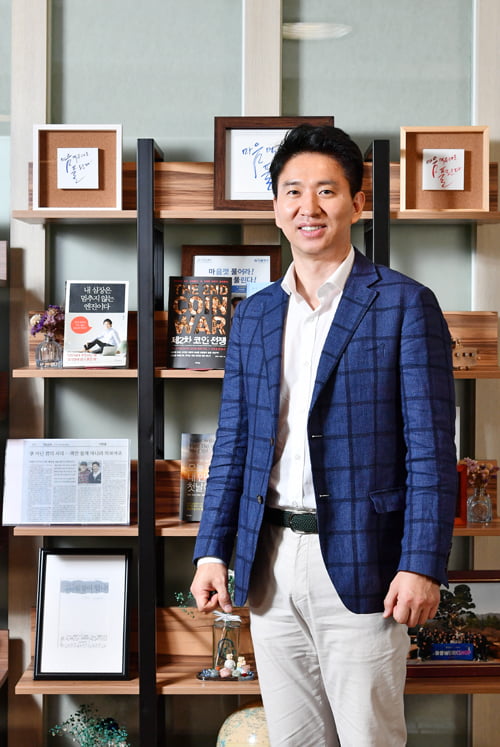
Subscription-type platforms and services such as Netflix or “Kindle” are becoming a current trend. Joseph Lee, a HYU graduate, and CEO of EKYSS, developed MYPOOL, the first subscription-type language service in Korea. he is also a pioneer in Korean language learning for foreigners. The Hanyang Journal had the opportunity to interview Joseph Lee and listen to stories about how he first started out as a CEO and how EKYSS was created.
# Introducing Joseph Lee, the CEO of the company EKYSS
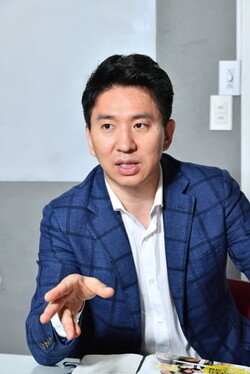
Q. Hello, please introduce yourself.
A. Hello, I am Joseph Lee, the CEO of the company EKYSS. I graduated from Hanyang University (HYU)’s School of Business and created ‘MYPOOL,’ a foreign language learning platform, and ‘GANADARA,’ a Korean language learning application. Recently, I have had an interest in the Korean language and writing, and I studied Hunminjeongeum, the traditional Korean script a lot in the process of developing GANADARA.
Q. Please tell us about your work currently as a CEO of EKYSS.
A. EKYSS was established on April 17, 2012. The reason why I set the company’s founding date as the 17th was a pledge not to lose the initial motivation I had when I was 17 years old. MYPOOL is not a mere internet lecture but it also enables efficient learning by allowing subscribers to solve related questions right away. My goal is to make EKYSS a global language education company, and MYPOOL a language learning ‘Netflix’ that serves various languages for various purposes such as travel English or business conversation. Recently, I have been working on developing and rebranding ‘CRATES,’ a Korean language learning platform, into GANADARA.
# The story of Joseph Lee as an educator in language and as a CEO
Q. Tell us the process of creating EKYSS through various foreign language learning apps.
A. I can say that I have been in the English education field for almost 20 years. I have developed English education videos in collaboration with ‘EBS,’ and I used to run a large English academy in Gangnam-gu, Seoul. Also, in cooperation with Gunpo City, I established Gunpo International English Education Center, a public English village for all. I have experienced failures in the education business, but I have not given up and paved my own way in English education.
Q. What made you dream of becoming an entrepreneur, especially in the education field?
A. When I was in my first year of high school, I had a dream of becoming a CEO, and you can see that my current company’s name, EKYSS, was created just like the company name, KYSS, one I had made at age 17. My first start-up company took off in November 2001, around my 31st birthday. The start-up item was an educational business that was combined with video media. There was a reason for choosing the field of education for my business. First of all, the educational field is wide and diverse. Depending on the content you create, the field is an endless blue ocean. In my opinion, the most important thing when making a business is to materialize items. Hence, I planned to make and materialize educational English videos for children among all contents, even before I established a company. It was then selected as an EBS English video co-operator within eight months of company establishment, thanks to it having a specific approach.
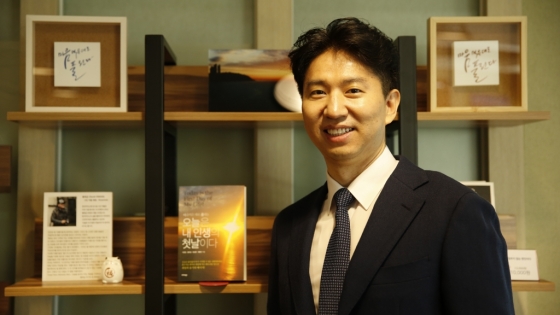
Q. What were some challenges in doing business as a CEO? How did you overcome them?
A. At first, when I had just established my company and was seeking collaboration with EBS, I made weekly visits. No one was aware of EKYSS because it was a newborn company at that time. I had no prior experience and was even harshly refused. Nevertheless, I kept visiting the office as if nothing had happened. I was persistent with only spirit and passion. I explained and persuaded the executives why I was the right person for this business and why EBS should collaborate with our company to release English educational videos. After persistently persuading for three months, they began to open up, little by little. However, a good purpose did not always mean a good process and that a result would follow suit. For instance, the public interest academy I founded several years ago is a model that lowers academy rent and educates needy students free of charge by utilizing idle spaces that are not used on weekdays, such as local churches and other facilities. However, when it became successful, private education academies strongly opposed. In some areas, the former head of the academy became a city councilor and suppressed it. In the face of collective opposition and organizational oppression from private education companies, the education centers had to close their doors without being able to properly realize their purpose, which eventually led to the company’s bankruptcy.
Q. Tell us the story of how you started your first business.
A. While I was searching for start-up items for the company, I had an opportunity to go on a business trip abroad. I was in China at the time, and when I turned on the morning broadcast, it was very refreshing to see English education content on every channel. I thought that there would also be a bigger demand for English education in the future in Korea, and I predicted that English education would develop into a very large market. I decided to start my business in English education in 2001. I did not major in a department related to English education in college, so I tried to make a good education system by putting in more effort.
# The story of Joseph Lee as a person, from a young boy in a poor family to a successful CEO and leader of language education
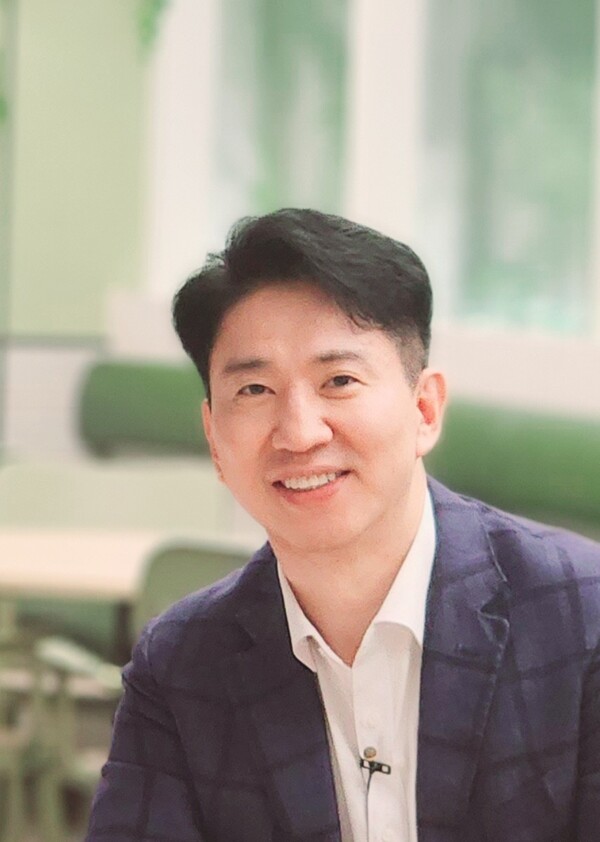
Q. How did you spend your childhood and school days? Tell us about the path that led to today’s success.
A. I was born into a visually impaired massage parlor family and grew up in a very small house with my family. But even then, I did not give up on my dream of becoming an entrepreneur. As my first job after graduating from HYU, I took ‘Samsung’ group’s public recruitment test and joined ‘Samsung C&T.’ I applied for the sales department because I wanted to learn sales at Samsung C&T to build experience and become skilled enough to build my own business in the future. However, I was assigned to the management department because I majored in business in college.
Q. Are there any hobbies that you have or other areas you are interested in besides work?
A. I have rather a lot of hobbies, and one of them is calligraphy. In a highly digitized modern society, an era where all communication ends with just one message on social media, I think it is necessary to grind ink on paper and write letters on paper in the sense that it lasts longer. As a person in the language and communication education business field, I do business in the context of digitalization. Nonetheless, I think I still prefer analog and consistent things.
Q. There must be hard times working as a CEO. Do you have your own way of relieving stress?
A. All of us already know how hard and annoying it is to go to the gym especially when you are having a hard time or when you are tired. But even when that happens, I go to the gym alone, rest quietly, and exercise. If you let go of the thoughts or worries in your mind, carry out basic exercises, and break a sweat, your passion comes to life again. I think I relieve stress by trying various sports such as boxing. As I mentioned on my ‘YouTube’ channel Myeongjingtv, I can say that “the sound mind and body, knowledge training, and a balanced life represents life.”
Q. You must have studied a lot to do business with a language education platform although you have not majored in education or language; What are your tips for studying foreign languages?
A. There is something I felt while doing a foreign language education business for 22 years. It is the difference between short-term memory and long-term memory. In order to effectively transfer a learned language to long-term memory, it is essential to solve related practice questions. In the process of learning a language, repeating and working on exercises with brief explanation is more helpful than only listening to explanations for a long time.
# About EKYSS and its language education platforms, MYPOOL and GANADARA.
Q. Please tell us about your future goals for the new platform GANADARA.
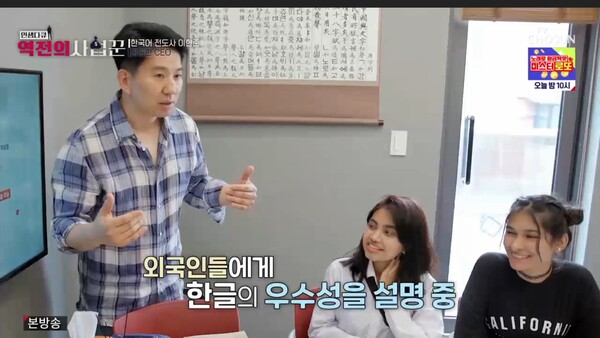
A. The number of applicants for the Korean Language Proficiency Test is increasing every year. This means that more foreigners are interested in Korea and the Korean language. I am trying to make Korean learning content made by Koreans more effective and fun. Also, my goal is to become a ‘Korean Interview evangelist,’ who spreads the Korean language and Korean culture around the world. In the case of GANADARA, English, Chinese, Indonesian, and Vietnamese are currently supported with the goal of customized learning according to the learner’s native language. We will gradually add more supporting languages including Russian, French, and Japanese, starting with Spanish.
Q. Thank you for the interview. Do you have any last words for HYU students, especially students who dream of becoming future CEOs?
A. I would like to introduce a book called Hoamjajeon to my juniors of HYU who dream of becoming a CEO. I introduced this briefly on my YouTube channel, but to tell you why I think you should read this book; students who dream of becoming entrepreneurs often think of a big company when it comes to business. But common stores on the streets are also businesses. What I want to say is that we are living in an era where one day even if it is not a big company, most will run something. And all of us are more likely to become an owner than a mere worker, whatever that business is to become. In that sense, I hope students of HYU can think about what entrepreneurs should be like in reality while reading the books I recommended.

